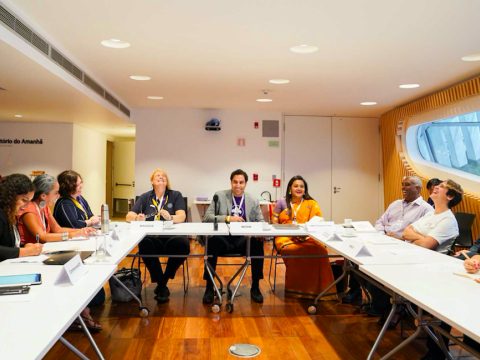The global Big 6 Youth Organizations call for more investment in non-formal education

The Big 6 alliance of Youth Organizations recently released a joint position paper highlighting their collective commitment to advancing youth development through delivering quality non-formal education programmes. The joint position of the Big 6 Youth Organizations aims at drawing more attention to the urgent need for increased investment in providing educational opportunities that go beyond the formal education system and underscores the importance of non-formal education and learning to tackle the global education crisis.
The joint position emphasizes that non-formal education is an equally essential form of education and calls for more balance between the different education and learning dimensions. Non-formal education, best suited to help young people acquire life skills, values, and resilience to social changes, is often underestimated. Without proper recognition, the benefits of non-formal education to enable young people and communities to reach their full potential is left unrealized. The joint position further calls for increasing the recognition of non-formal education and its learning outcomes, as well as an increase in funding to non-formal education providers and its associated infrastructure (i.e. youth centres).
Formed in 1996, the Big 6 Youth Organizations are an alliance of leading international youth-serving organizations that include: World Alliance of Young Men’s Christian Associations (YMCA), World Young Women’s Christian Association (YWCA), World Organization of the Scout Movement (WOSM), World Association of Girl Guides and Girl Scouts (WAGGGS), the International Federation of Red Cross and Red Crescent Societies (IFRC), and The Duke of Edinburgh’s International Award Foundation. Together, the Big 6 Youth Organizations actively involve over 250 million young people. Supported by the involvement of adults, these organizations have contributed to the non-formal education of more than a billion young people during the last century.
The Big 6 Youth Organizations actively call policymakers around the world to encourage and strengthen partnerships between formal, informal and non-formal education in order to create policies that holistically meet the education and learning needs of young people. The Big 6 invite other organizations to join the global conversation on jointly promoting non-formal education for the benefit of young people from different regions around the world.
The joint position was released following the closing of the World Non-Formal Education Forum, which convened over 70 leading organizations in the non-formal education sector and produced the Rio Declaration on Non-Formal Education as an outcome of the Forum’s proceedings.
-
Joint Position on Non-Formal Education .pdf